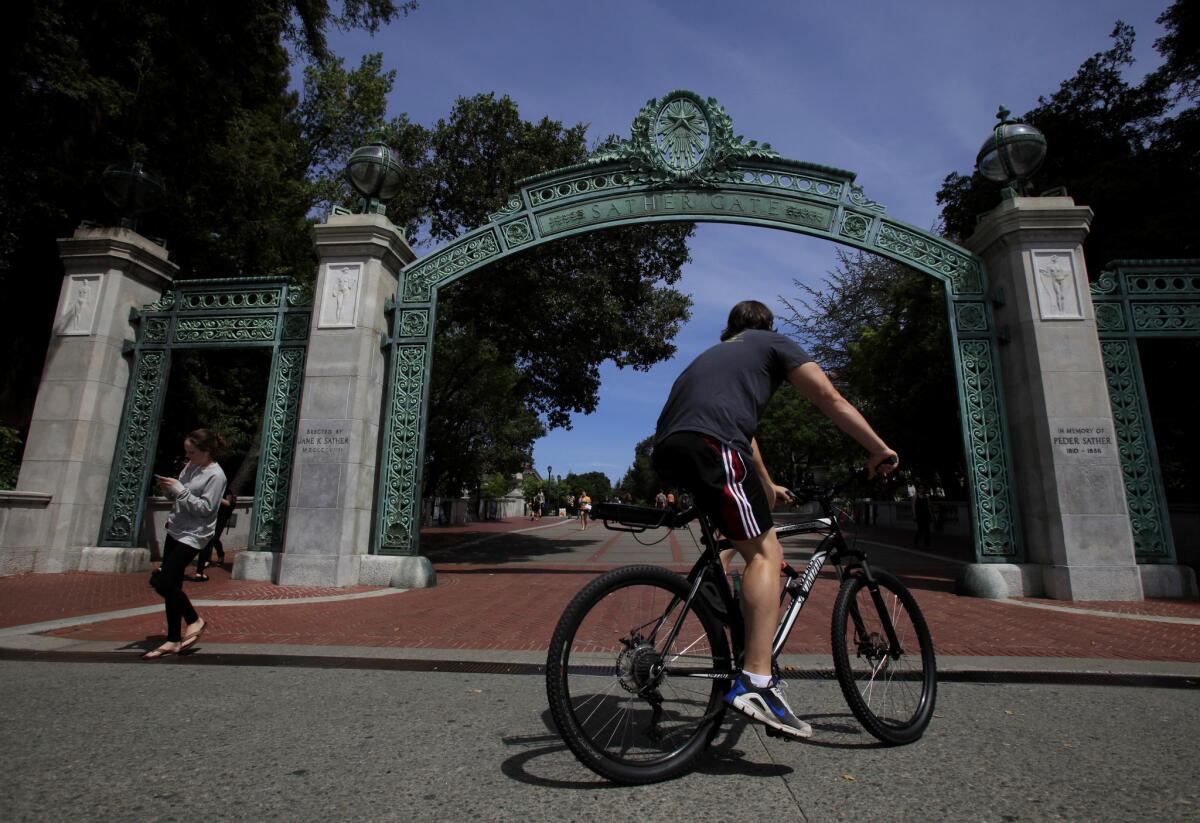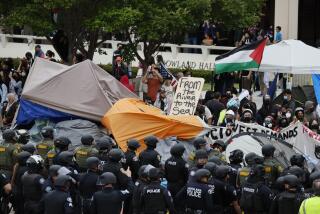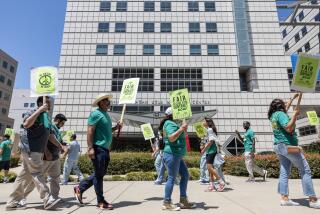Some UC regents fret that critical state audit resulted in unfair attacks on out-of-state students

Reporting from Sacramento — University of California regents counseled a measured approach Tuesday in responding to a critical state audit that said UC schools were admitting too many applicants from outside the state, to the detriment of local students.
UC officials have blasted the audit, saying it unfairly glossed over the fact that out-of-state students supported the 10-campus system by paying higher tuition than California residents — an extra $728 million in 2014-15 alone. That money helped campuses increase enrollment of in-state students despite the fact that the system lost one-third of its funding after the 2008 recession, according to UC President Janet Napolitano.
But on the opening day of a three-day meeting in Sacramento, some regents urged UC officials to work collaboratively with state auditors to address concerns in the report.
“Try and avoid being defensive,” advised regent Rod Davis.
Join the conversation on Facebook >>
Others fretted that the political furor kicked up by the audit had resulted in unfair attacks on out-of-state students -- portraying them as usurpers valued only for the higher tuition they pay, not their educational talents.
Regent John A. Pérez, the former state Assembly speaker, said that criticism of out-of-state students reminded him of arguments that minorities were taking seats from white students under UC’s affirmative action policies, which were banned by Prop. 209 in 1996.
Pérez also expressed concern that regents were not consulted as the auditors developed their report and recommendations. He said, however, that state Auditor Elaine Howle and her staff were “incredibly talented.”
“Conversations would be better than accusations back and forth,” he said.
NEWSLETTER: Get the day’s top headlines from Times Editor Davan Maharaj >>
Nathan Brostrom, UC’s chief financial officer, assured regents that university officials were cooperating with state auditors to improve reporting and public disclosure about the admissions process. The audit recommended such measures, along with stricter entrance requirements for nonresident students, a cap on their enrollment and more focus on recruiting Californians — particularly African Americans, Latinos and other underrepresented minorities, among other proposals.
UC officials are required to report their progress in implementing the recommendations after 60 days, six months and one year from the March 29 report date.
Monica Lozano, board of regents chairwoman, reminded meeting participants that the state cut $1 billion from UC’s budget after the 2008 recession, forcing UC to double tuition over three years. With continued hikes unsustainable, she said, university officials turned to out-of-state students, who pay nearly $25,000 more in tuition than Californians.
Without those added dollars, she said, UC would have had to turn away tens of thousands of students, as the California State University system did in their response to deep state budget cuts.
Lozano reiterated that 85% of UC students are Californians.
“We are unequivocally committed to giving preference to California students at UC,” Lozano said.
Also Tuesday, regents discussed Napolitano’s plan to add 14,000 new beds by 2020 to help ease a systemwide student housing crunch.
The university provides housing for more than 87,000 students, about 34% of total enrollment. But nearly 15,000 undergraduate and graduate students and their families are on waiting lists, with the largest contingents at UCLA, UC San Diego, UC Irvine and UC Berkeley. High rental costs and low vacancy rates have exacerbated the problem, officials said.
Earlier in the day, five UC Davis professors spoke in support of Chancellor Linda Katehi, who was placed on administrative leave by Napolitano last month pending the results of an outside investigation into allegations of conflicts-of-interest and ethical violations.
Napolitano ordered the investigation into “serious questions” over Katehi’s involvement in jobs for family members, possible misuse of student funds and “material misstatements” about her role in the hiring of social media firms to bury negative publicity about campus police who pepper-sprayed peaceful student protesters in 2011. If proven, Napolitano said, the actions may violate university policies on conflicts of interest, ethical conduct and use of student fees.
Katehi’s attorney has called the allegations “entirely unjustified.”
Faculty members told regents that Katehi had improved academic excellence, diversified the campus and enrolled more California students than any other UC campus.
Walter Leal, a professor of biochemistry, said Katehi had been “thrown under the bus” by UC officials.
“We are appalled,” Leal said.
Follow me on Twitter @TeresaWatanabe for more education news.
MORE ON EDUCATION
School principal: ‘Harry Potter’ and ‘Lord of the Rings’ cause brain damage
Cellphone videos show massive lunchtime brawl at Sylmar High School
More to Read
Sign up for Essential California
The most important California stories and recommendations in your inbox every morning.
You may occasionally receive promotional content from the Los Angeles Times.











